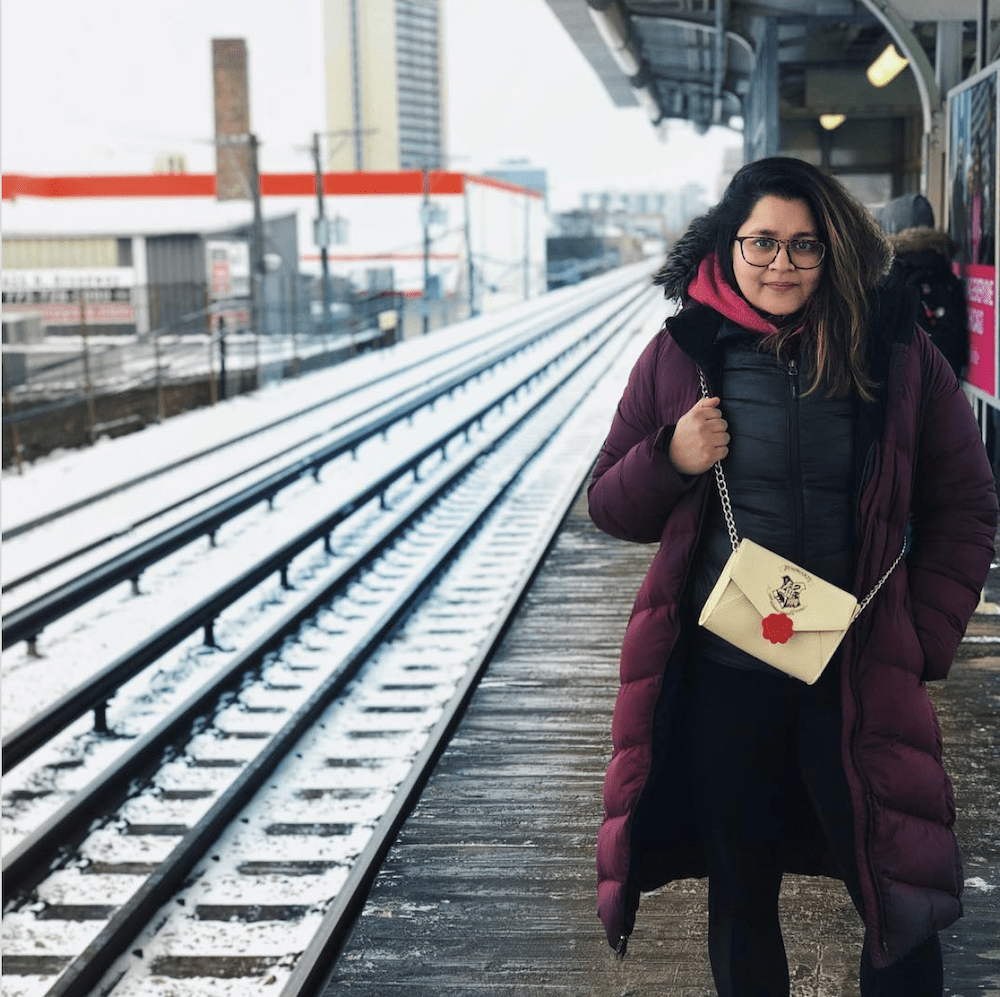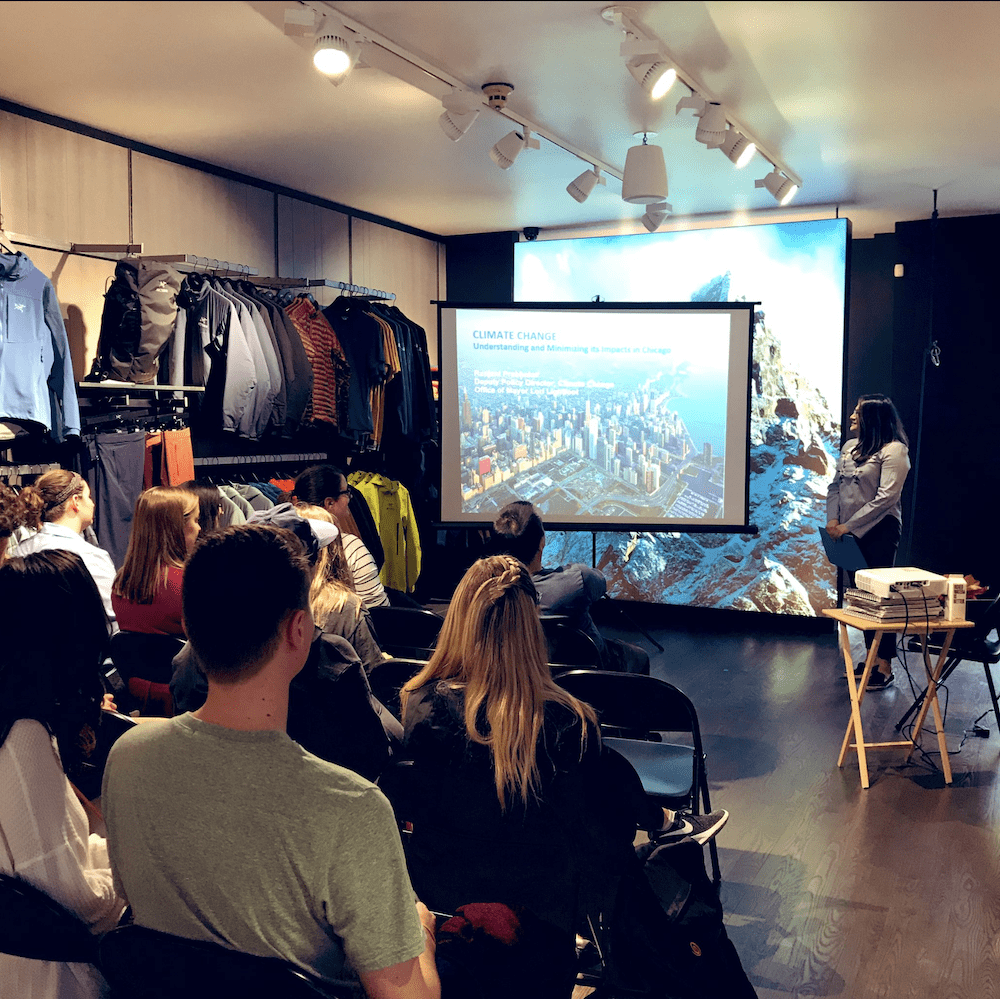This article is part of our ongoing speaker series, where we interview Mappy Hour speakers from chapters across the country.
Ranjani Prabhakar has worked in a field that is becoming increasingly important by the day: climate change policy. Having worked in the Mayor’s Office in Chicago and now for the environmental law firm Earthjustice, she has been a strong advocate of empowering communities to be climate resilient and in harmony with the natural world. According to Ranjani there is so much more to sustainability than simply using a metal straw or a paper bag, because “when we focus on where we can make the most impact, we can make even greater changes.” Mappy Hour sat down with Ranjani to dig into this and discuss the significance of sustainable policies, and how everyone can pitch in to make their own communities climate conscious.
First off, can you tell us a bit about your journey? How did you become such a big advocate of eco-friendliness in cities?
My career journey has been somewhat peripatetic and non-linear, where one thing usually leads me to the next, so I sort of stumbled onto this. I graduated college with a liberal arts degree hoping to vaguely explore law and government, but not knowing where to focus my energy and skills. I ended up working for an affordable housing nonprofit where my colleagues were a group of very dedicated city planners. That’s when I first discovered the field of planning, which appealed to me as an interdisciplinary study of policy, physical design, nature and human behavior. It’s about moving the needle on complex structural change to improve the way people live and to empower people to thrive in their communities. Like many liberal arts grads, I went into the ‘real world’ paralyzed by choice, and discovering city planning was the closest I had felt to a glove fitting.
I obtained a graduate degree in City Planning and Civil Engineering, mostly focusing on transportation systems. I was intrigued by this idea of access and connectivity being a barometer for quality of life. Tied to that is the hard truth that our transportation sector is the largest source of the country’s climate-damaging emissions. One opportunity led to the next, and I found myself at the Chicago Mayor’s Office on the sustainability team working on energy policy, something I really didn’t have expertise in. This was my foray into the world of sustainability. Sustainability is an umbrella term for achieving a holistic balance of economic, social and environmental outcomes. It was another glove-fitting pinpoint career-wise, and has allowed me to explore the climate movement further. Now, I work in federal policy on climate issues as a lobbyist, pushing Congress to achieve more in this space.

Can you also tell us about your profession? What are the various types of jobs in the sustainability world?
I get asked this question frequently and am somewhat at a loss, since I feel like I am still new to this space! Sustainability is a broad discipline, and like city planning, it explores the bridge between social and hard science. If you are interested in protecting our natural environment and human and ecological health, there are tons of opportunities. Sustainability also spans multiple sectors – government, public health, agriculture, finance, tech — that it seems more like an integrated value system than a particular industry. Most issues in today’s world have a sustainability component that you can approach with a variety of skill sets, both technical and analytical/creative. I’ve heard this said a lot recently, but soon, every job will be considered a “climate job” because of how cross-cutting these issues really are.
Sustainability is a big topic in these times, but not that many people will probably know how to define it when asked. How would you define sustainability?
There are a lot of definitions out there, both official and unofficial. To me, sustainability is not just about the environment or infrastructure. It’s about restoring and nurturing ecological communities and human relationships with the land and its people. Humans are an integrated part of the natural world – we are not separate from what we call “nature.” Defining sustainability requires us to think much more broadly about ecology, and how our role in it helps us support equitable advancement of human society and the need to protect natural ecosystems these societies rely on.
Sustainability comes up often in eco-consumerism (i.e. the topic of reusable straws or recycling are hot topics right now). I would broaden that out a bit further; it’s not just about materials and what we choose to buy, to me it’s a lot about ethos and human behavior. How can value-based lifestyle choices become more normative, accepted, and most importantly, easy? This is where policy work is crucial to take the onus off of individuals or households, and make sure that our systems are making it much easier for people to make their own decisions without compromise. Sustainability means that we’re providing and encouraging options that can have an enormous impact
Now that we’ve defined it, why is sustainability in cities so important, especially in big cities like Chicago or New York?
Cities are major growth engines that run on its people, who are known to move, create, and convene constantly. If this is not done with reverence to our shared ecology, all of this creates impact and increases our collective reliance on fossil fuels. Our cities are now the most important epicenters in the climate fight, because that’s where the majority of the global population resides today. It’s important we think about growth, especially in cities, with an eye towards sustainability and understanding long-term consequences.
Chicago is one of the most diverse cities in the country in terms of race, nationality and income. That means the decisions the City makes will invariably have diverse outcomes. Chicago is also a notoriously segregated city. By prioritizing sustainability in decision-making, especially in a city like Chicago, we create equity in social systems. If sustainability is about thriving and surviving, then we need to pay attention to our most vulnerable populations who have historically faced multiple systems of oppression, and who are now far more likely to experience the effects of climate change.
Globally, cities are nimble and rely on leadership that is directly accountable to its residents. The decisions cities make now will have seismic effects on how governments address climate change everywhere. Given the lack of climate leadership in the last administration in the White House, it is no surprise that city leaders have risen to that challenge in recent years.

How well do you think cities are doing in their efforts to work towards sustainability?
To me, cities are the current leaders of the climate fight. For one thing, city government is a lot more malleable to enacting policy and creating programs than larger scales of government. City leadership is also directly accountable to the city’s residents – mayors and council people live and work in the communities they serve. The other thing is that half of the global population lives in cities, and that number is going to grow as we continue to urbanize. Cities are now faced with this problem that they continue to grow, and they need the resources to keep up. The reason I fell in love with studying cities is that they seemed to operate like living organisms. Every city has a metabolism, every city has its own framework of natural and facilitated operations flowing in and out of its system – which means that there’s going to be an impact to that. There are also a lot of organizations that are convening cities to take on a more collective leadership role to talk about how they can face this environmental crisis on a global scale. So I think if you’re looking for climate leaders, if you’re curious where the work gets done, I’d check out the cities closest to you for opportunities to get involved.
Going off of that question, what can normal residents do to help the cause themselves?
The planet thrives when we thrive. We are so powerful in our abilities to speak up and nurture our communities. One way to help the cause is to support the original stewards of the land. Indigenous wisdom and knowledge is a key source of insights to support ecological restoration and managing natural resources. Indigenous peoples comprise only 4% of the world’s population today, but maintain about 80% of the earth’s biodiversity. Donate to your local Land Back movement, learn more about the rightful stewards of the land you live on, and prioritize the protection of Indigenous lands and sovereignty in your climate advocacy.
I suppose that, in answering this question, what many people want to know is how they can reduce their carbon footprint. This isn’t a metric I choose to live by, but I think that personal lifestyle choices like limiting your gas mileage, being thoughtful about your food choices, and unplugging devices in your home are ones to think about. However, none of these things are sustainable in the long term if we don’t have strong policy efforts across governments that allow and empower individuals and households to make the right “low-carbon” choices for themselves. So keeping our elected leaders accountable for climate action is crucial.

